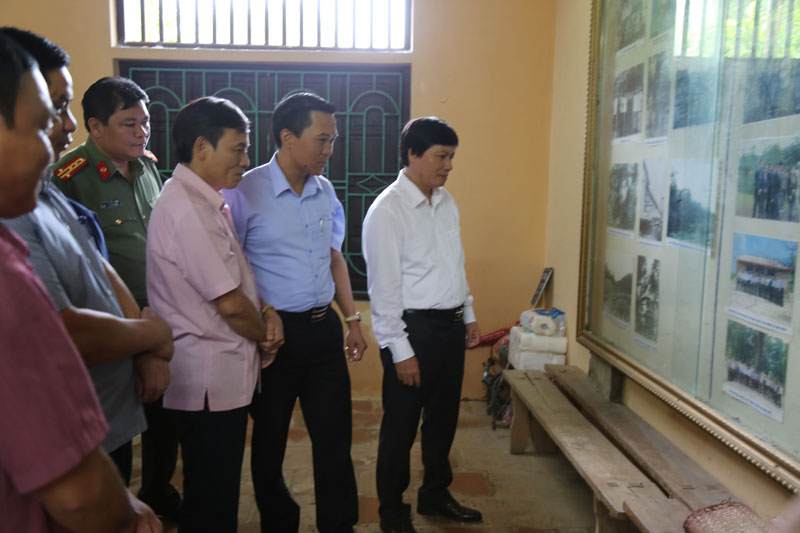
(HBO) - Tran Dang Ninh, Permanent Vice Secretary of the provincial Party Committee cum Chairman of the provincial People's Council visited and presented gifts to the Party Organisation, authorities and people of Cao Phong – Thach Yen revolutionary base (now Yen Thuong, Yen Lap and Tan Phong communes).
Photo: Tran Dang Ninh, Permanent Vice Secretary of the provincial
Party Committee cum Chairman of the provincial People's Council and leaders of
departments and agencies of Cao Phong district present gifts to three communes
of Cao Phong – Thach Yen revolutionary base.
In 1944, the Party Committee of North Vietnam assigned comrade Vu Tho to Cao
Phong – Thach Yen to raise public awareness of revolutionary cause, paving the
way for the establishment of a revolutionary base. In July 1945, Tho recruited
30 militiamen in the town to open a military training course. Initially, the
classroom was based in Ngai village, then dislocated to the hill of Khanh
pagoda, Thach Yen commune (now Yen Lap and Yen Thuong communes). Only in a
short time, the revolutionary forces grew strongly, gained control of the
revolutionary base and waited for revolutionary moment. On August 23 morning in
1945, together with the provincial fellows, they won back the administration.
The place was recognised as a national relic site by the Ministry of Culture
and Information in 1996.
Building on the past achievements, Yen Thuong, Yen Lap and Tan Phong communes
have always believed in the Party leadership and strived to fulfill or surpass
socio-economic targets. Political security has been maintained while local
lives have improved.
Speaking to leaders of the three communes, Ninh recalled the historic tradition
of the Cao Phong - Thach Yen revolutionary base and lauded their
socio-economic-cultural achievements. He asked the localities to exert more
efforts to realise goals set in resolutions adopted by the congresses of their
Party Organisations for the 2015-2020 tenure , while raising young generations’
awareness of revolutionary tradition./.

Photo: Tran Dang Ninh, Permanent Vice Secretary of the provincial Party
Committee and Chairman of the provincial People's Council and leaders of
departments and agencies of Cao Phong district visited Cao Phong – Thach Yen
revolutionary base at Khanh pagoda, Yen Thuong commune.
The Standing Board of the Hoa Binh provincial Party Committee has agreed in principle on a proposal by the Standing Board of the Party Committee of Hoa Binh city to gather feedback on the city’s 1:2000 zoning plan, which forms part of its broader urban development strategy.
Hoa Binh province has made notable progress in public administration reform and digital government development, with the satisfaction index among citizens and businesses reaching over 84%, according to recent government evaluations.
Thanks to great efforts by local authorities in recent times, the governance and public administration performance of Mai Chau district has been significantly improved.
In the afternoon of June 6, the Party Committee, the People's Council, the People's Committee and the Fatherland Front of Lac Son district solemnly held a meeting to celebrate the 139th anniversary of the district's founding (1886–2025) and the 79th anniversary of the establishment of the district's Party Committee (1946–2025). There was the attendance of Mr. Bui Van Thang, the Vice Chairman of the Provincial People's Council; Mr. Quach Tat Liem, the Vice Chairman of the Provincial People's Committee; Ms. Dang Bich Ngoc, the Deputy Head of the National Assembly Delegation of the province; as well as the former leaders of the province and district through various periods, who are the natives of the district.
Implementing the Politburo’s Resolution No. 57-NQ/TW on breakthroughs in science – technology, innovation, and digital transformation is a golden opportunity for the northern mountainous province of Hoa Binh to renew growth model, improve competitive edge and shorten digital gap.
Resolution 57-NQ/TW, issued by the Politburo on December 22, 2024, identifies sci-tech, innovation, and digital transformation as strategic breakthroughs to build a developed and prosperous nation. In Hoa Binh province, this spirit is not just a slogan, it’s being put into action through concrete initiatives that form a "new development triangle”: digital citizenship, digital economy, and digital administration.




